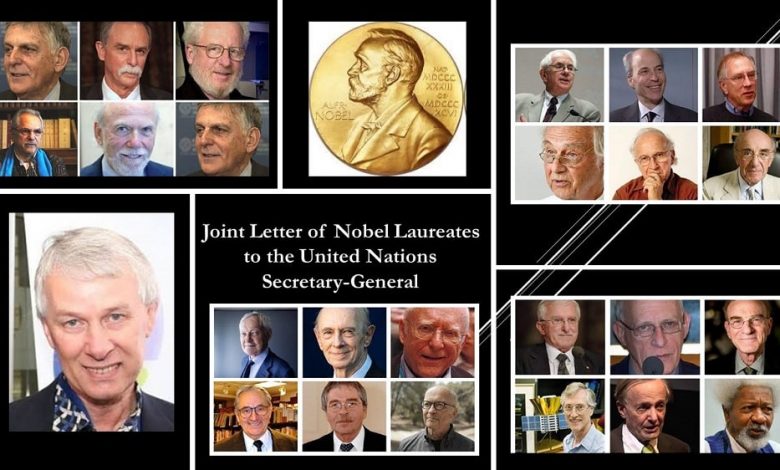Iran: Joint Letter of Nobel Laureates to the United Nations Secretary-General Regarding the 1988 Massacre

Written by
Mansoureh Galestan
In a letter to UN Secretary-General Antonio Guterres, 25 Nobel laureates expressed their solidarity and sympathy with the relatives and friends of those executed during the 1988 massacre of the political prisoners in Iran. The Nobel laureates “underscore the need to set up an international commission by the United Nations to investigate this enormous crime.”
They cited statements by Amnesty International and other human rights organizations stating that “Ebrahim Raisi, the then-Deputy Prosecutor of Tehran, was part of the four-member Death Committee in Tehran. This committee executed thousands of prisoners who were members of the MEK along with several hundred prisoners affiliated with other groups in Evin and Gohardasht prisons”.
The Nobel laureates wrote to the Secretary-General of the United Nations, “In the absence of international accountability, genocide and crimes against humanity persist in Iran. Among these are the continuation of political executions and the murder of at least 1,500 young protesters in November 2019. The regime’s attempts to conceal the fate of the victims from their families, to minimize the number of executions, and to hide the victims’ affiliation with the MEK, only add to the mullahs’ criminal record.”
The full text of the letter:

Joint Letter of Nobel Laureates
to the United Nations Secretary-General
September 8, 2021
His Excellency António Guterres
Secretary-General
The United Nations
New York, NY 10017
Excellency,
We, the Nobel laureates signing this letter, on the 33rd anniversary of the massacre of political prisoners in Iran, reiterate our solidarity and sympathy with the relatives and friends of those executed and also the Iranian people. We underscore the need to set up an international commission by the United Nations to investigate this enormous crime.
Thirty-three years ago, Khomeini, the founder of the religious dictatorship in Iran, issued a fatwa in his own handwriting, which said: All prisoners who are loyal to the Mujahedin-e Khalq (MEK – the main Iranian opposition movement) are considered Mohareb (one who wages war on God) regardless of the stage of their prison term, and should be executed.
Based on this fatwa, 30,000 political prisoners were executed over several weeks after being interrogated by the so-called Death Committee for two or three minutes. Those who refused to condemn the MEK were immediately sent to the execution hall. More than 90% of those executed were members and supporters of the MEK. Due to their “immunity” from punishment, members of those committees, who were the main perpetrators of the massacre, hold some of the highest positions in the Iranian regime.
Heightening the need for the formation of an International Commission of Inquiry is the fact that Ebrahim Raisi, the new president of Iran, was one of the main perpetrators of this massacre. According to various human rights authorities, including Amnesty International, the UN High Commissioner for Human Rights, and prominent international human rights experts, and according to an audiotape belonging to Ayatollah Montazeri, Khomeini’s former designated successor, Ebrahim Raisi, the then-Deputy Prosecutor of Tehran, was part of the four-member Death Committee in Tehran. This committee executed thousands of prisoners who were members of the MEK along with several hundred prisoners affiliated with other groups in Evin and Gohardasht prisons.
The current Iranian leaders, including Ali Khamenei and Raisi, were directly involved in the 1988 massacre.
In the absence of international accountability, genocide and crimes against humanity persist in Iran. Among these are the continuation of political executions and the murder of at least 1,500 young protesters in November 2019. The regime’s attempts to conceal the fate of the victims from their families, to minimize the number of executions, and to hide the victims’ affiliation with the MEK, only add to the mullahs’ criminal record.
Signatories:
• Professor Harvey Alter, Nobel Prize, Medicine 2020, USA
• Professor Barry Barish, Nobel Prize, Physics 2017, USA
• Professor Georg Bednorz, Nobel Prize, Physics 1987, Germany
• Professor Thomas Cech, Nobel Prize, Chemistry 1989, USA
• Professor Elias Corey, Nobel Prize, Chemistry 1990, USA
• Professor Joachim Frank, Nobel Prize, Chemistry 2017, USA
• Professor Sheldon Glashow, Nobel Prize, Physics, 1979, USA
• Professor Roger Guillemin, Nobel Prize, Medicine 1977, USA
• Professor Dudley Herschbach, Nobel Prize, Chemistry 1986, USA
• Professor John Lewis Hall, Nobel Prize, Physics 2005, USA
• Professor Oliver Hart, Nobel Prize, Economics 2016, USA
• Professor Alan Heeger, Nobel Prize, Chemistry 2000, USA
• Professor Roald Hoffmann, Nobel Prize, Chemistry 1981, USA
• Professor Robert Huber, Nobel Prize, Chemistry, 1988, Germany
• Professor Roger Kornberg, Nobel Prize, Chemistry 2006, USA
• Professor Fynn Kydland, Nobel Prize, Economics 2004, Norway
• Professor John Mather, Nobel Prize, Physics 2006, USA
• Professor Paul Modrich, Nobel Prize, Chemistry 2015, USA
• Professor John Polanyi, Nobel Prize, Chemistry 1986, Canada
• Mr. Jose Ramos-Horta, Nobel Prize, Peace, 1996, East Timor
• Professor Richard Roberts, Nobel Prize, Medicine 1993, USA
• Professor Randy Schekman, Nobel Prize, Medicine 2013, USA
• Professor Danny Shechtman, Nobel Prize, Chemistry 2011, USA-Israel
• Professor Wole Soyinka, Nobel Prize, Literature 1986, Nigeria
• Professor David Wineland, Nobel Prize, Physics 2012, USA

